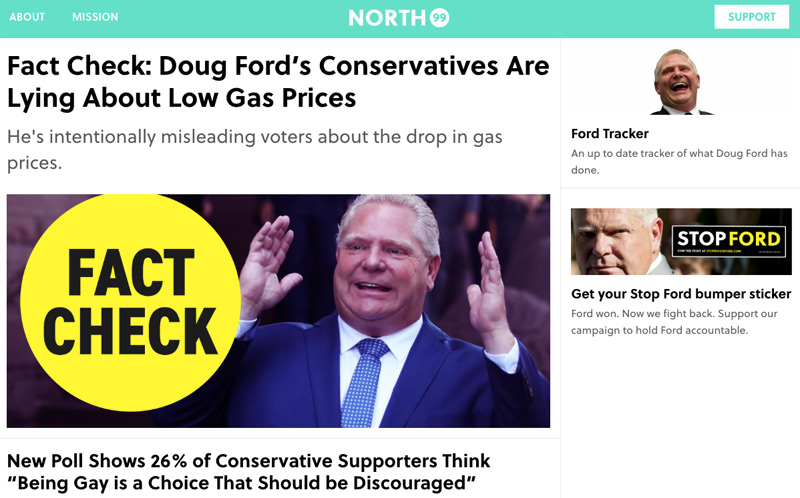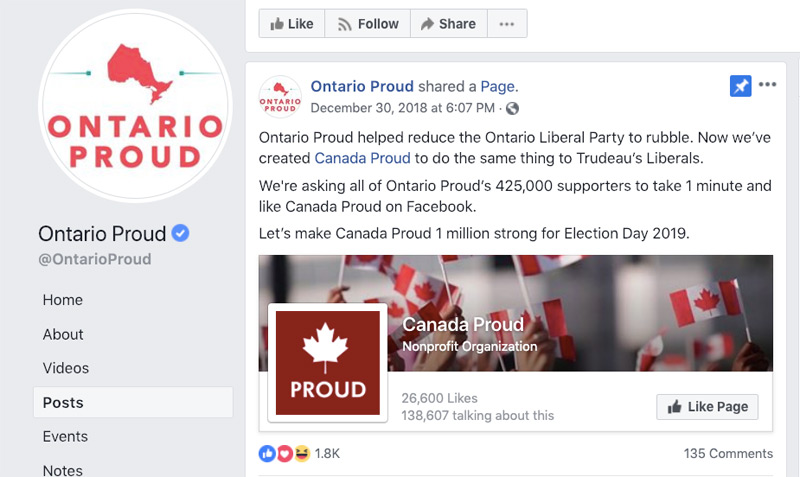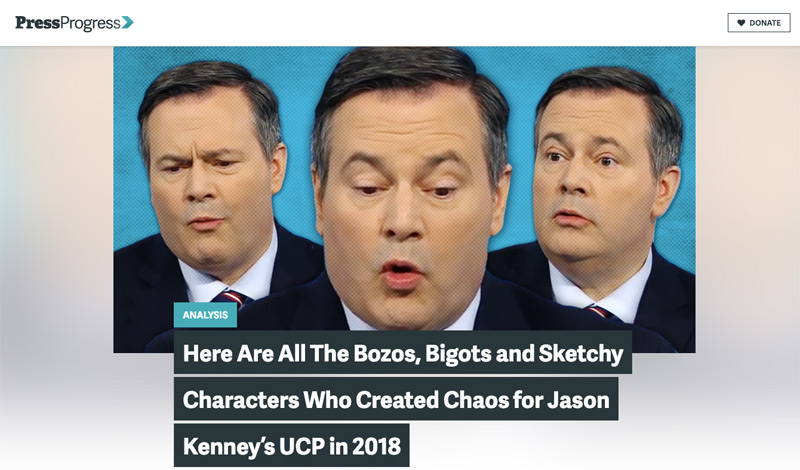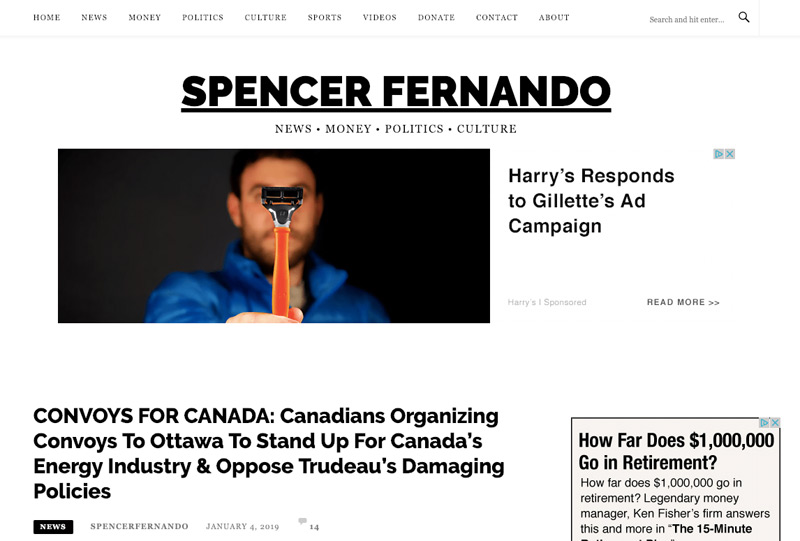
A new wave of alternative political media operations has been growing in Canada over the last few years, and these sites and groups will be looking to sway voters in the lead-up to the federal election this fall.
One of the first prototypes for success was Rebel Media, a wildly popular far-right outlet and hyper-partisan political advocacy group that rose from the ashes of Sun News Network’s early-2015 implosion. Despite highly publicized setbacks, The Rebel still boasts over a million monthly visitors to its website, according to SimilarWeb estimates, and racks up several million views on its YouTube videos each month.
But several other Canadian political media startups — although not nearly as incendiary or as big as The Rebel — have also grown popular online in very short order, largely flying under the radar of the mainstream media’s attention. Although we have covered a couple of these organizations in the past, we believe a one-stop guide would be a helpful resource for Canadians looking for background information on our country’s rapidly evolving political media ecosystem.
Below are six profiles of relatively new startups that continue to grow more influential by the day in shaping political discourse in Canada.
Jump to:
• The Nectarine
• North99
• Ontario Proud
• The Post Millennial
• PressProgress
• SpencerFernando.com

What it is: Launched in the summer of 2018, The Nectarine is a conservative news website with politics, business, sports, and entertainment sections, mixing original reporting and Canadian Press wire copy. It also offers a daily newsletter, and much of its content is shared and cross-promoted by Ontario Proud on its Facebook page. In its first several months, The Nectarine has published the odd exclusive, such as reporting on the councillors of Alberta’s Bigstone Cree Nation quietly granting themselves $60,000 bonuses.
Where it’s physically based: Montreal
Who’s behind it: The Nectarine shares three of its founders with The Post Millennial (another site on this list): Matthew Azrieli, a property manager of commercial real estate; Ali Taghva, a former president of the NDP’s Richmond Hill riding association; and SEO consultant Madison Hofmeester. The fourth co-founder is Jeff Ballingall of Ontario Proud.
Who funds it: According to its website, The Nectarine funds itself through ads, Patreon support, hosting events, and “an agency side” of the business that involves handling web development and ad campaigns for clients. However, its Patreon page doesn’t show any patrons, and it’s unclear who provided the seed investment for the news outlet. In an interview, Taghva explains that The Nectarine shares back-end resources with The Post Millennial.
How far it reaches: The Nectarine has over 10,500 likes on Facebook and 1,600 followers on Twitter. SimilarWeb estimates that The Nectarine’s traffic fluctuates between 100,000 to 300,000 monthly visits, with 68 per cent coming from social media (93 per cent from Facebook, and another 7 per cent split between Twitter and Reddit).
What’s next for it: In addition to The Nectarine and The Post Millennial, Taghva says he, Azrieli, and Hofmeester are “preparing to set up a satire website” that he describes as “like The Beaverton but centre-right.”

What it is: North99 appears to be a centre-left-progressive mirror-image response to Ontario Proud. A non-profit incorporated in August 2017, North99 creates shitposting memes mocking Ontario Premier Doug Ford, federal Conservative leader Andrew Scheer, and other Conservative leaders, while contrasting Prime Minister Justin Trudeau as a competent and honourable world leader compared to U.S. President Donald Trump.
Similar to PressProgress (also on this list), they publish myriad critical articles about Conservative politicians and other right-wing figures. Some of the subjects they’ve covered have included the connections between the Koch brothers and Canadian Conservative politics, the relationship between the Manning Centre and a company that worked with Germany’s far-right AfD party, and The Rebel’s connections to Quebec City mosque shooter Alexandre Bissonnette.
They also try to pressure governments to adopt progressive policies, such as creating petitions to shut down offshore tax havens and ban handguns, which also allows them to compile an email list of supporters like Ontario Proud. They’ve run campaigns to get Shopify to ban “hate groups from their platform, including the violent right-wing Proud Boys” and to discourage Rogers from broadcasting Faith Goldy’s ads in Toronto’s mayoral election.
North99 registered as a third-party advertiser in last year’s Ontario provincial election and ran a “Stop Ford” campaign advocating strategic voting to keep Ford’s PCs from winning.
Where it’s physically based: Toronto
Who’s behind it: The organization has four listed directors: former Trudeau and Ontario Premier Kathleen Wynne campaign staffer, and co-founder of a “cannabis business accelerator” company, Taylor Scollon; former consultant for prominent public strategies and communications firm Navigator and digital manager for Wynne Geoff Sharpe; freelance writer and web designer (developing pages for the federal Liberals back in 2015) Tara Mahoney; and doctor Safi Sayeed.
Scollon says he and Sharpe run the day-to-day activities of North99, while also doing freelance digital marketing and web development for independent clients on the side. (Scollon has been CANADALAND’s web developer since early 2016.)
Scollon and Sharpe both host their own podcasts for their progressive media outlet The Cable, whose content is cross-promoted by North99’s Facebook page. While positions held by North99 and The Cable often align with federal Liberal policies on issues like carbon pricing and firearms, Scollon writes in an email that they “advocate for progressive policies and ideas, not political parties or politicians.”
Who funds it: “We are funded 100% by individual grassroots donors, with an average donation of $16,” writes Scollon. “Our largest donation was $500.” As of late last year, there were just under 300 donors contributing $5 or more monthly to North99.
The website’s About page also states that they don’t “receive any funding from large organizations, corporations, or foreign donors.” But North99’s website discloses a partnership with advocacy group Wellington Water Watchers and provides a contact (priority@north99.org) for “other organizations [who] help promote progressive issues” to inquire about partnering.
“Over the spring we partnered with Wellington Water Watchers on a volunteer basis to advocate for protection of Ontario’s freshwater from private corporations like Nestle, who extract public water and sell it off for a profit,” says Scollon. “It involved supporters sending letters to the Ontario Liberal government calling on them to ban the sale of public water by private corporations.”
How far it reaches: According to SimilarWeb data, North99 receives an estimated 102,000 monthly visits, of which two thirds come from social media: 71 per cent from Facebook, 21 per cent from Reddit, and 8 per cent from Twitter. Its Facebook page has over 78,000 likes, and Scollon says they have 60,000 email supporters.
What’s next for it: To inform a coming campaign focused on the 2019 election, North99 recently surveyed its community members to determine their top issues. Scollon says the organization aims “to push all parties and candidates to embrace a range of progressive policies. We will be calling attention to those candidates who refuse to do so.”

What it is: The third-party political advertiser has continued to steadily grow its influence in Ontario and across the country since we first profiled the group toward the end of 2017. Ontario Proud’s content used to mainly consist of shitposting memes and videos primarily targeting former Liberal Premier Wynne (and then Ontario NDP leader Andrea Horwath, when she started polling well during the last provincial election). Since the Wynne government was ousted from power in June, OP has focused its crosshairs squarely on the PM. Ontario Proud also shares negative news stories on the Trudeau government, and is now promoting The Nectarine (further up this list), with which it shares a co-founder, Jeff Ballingall.
Where it’s physically based: Toronto
Who’s behind it: Ballingall previously worked for the Harper government, the Sun News Network, and Navigator. Ontario Proud’s other co-founders include personal-injury lawyer Ryan O’Connor and Chris Spoke, another Sun News alum.
Who funds it: Despite its self-portrayal as a “grassroots” group, the overwhelming majority of OP’s political advertising in the run-up to Ontario’s June 2018 election was funded by companies connected to the development industry, according to mandatory filings with Elections Ontario. However, the sources of funds spent on non-advertising-related activities — like phone and text message polling, staff salaries, and door-to-door campaigning — do not need to be disclosed, nor were there any legal limits placed on the funding of these activities. Last fall, PressProgress (also on this list) reported on a confidential Ontario Proud fundraising pitch to special interest groups, asking for upwards of $700,000 in contributions.
How far it reaches: Unlike most other populist political media on this list, Ontario Proud primarily focuses on pushing content on Facebook and building its page’s following, instead of driving traffic to its website. Ontario Proud’s Facebook page has over 425,000 likes, up almost 50 per cent over the last 14 months, and an October video about Tori Stafford’s murderer being moved to a healing lodge is shown by Facebook as having over one million views. By asking its audience to sign petitions and take a pledge to vote out Wynne last year, Ontario Proud has also built up a large email and postal code database, which Ballingall says is now up to more than 150,000 supporters.
Through the month of December, the third-party advertiser, on behalf of an undisclosed client(s), launched a #StopSaudiOil advertising blitz, which according to Ballingall included a $21,000 ad buy with the TTC that covered a streetcar inside and out for a month, as well as $69,000 on digital and radio advertising.
What’s next for it: When Ballingall is asked what Ontario Proud has planned for this year’s federal election, he gives a one-word reply: “Lots.”

What it is: The Post Millennial (TPM) was created in August of 2017 as an alternative Canadian news outlet with a right-of-centre editorial leaning. Editor-in-chief Ali Taghva, who also edits The Nectarine, says there are around 30 employees (and dozens of contributors) between the two sites, with almost two dozen on staff at TPM.
TPM includes articles that match (re-report) other outlets’ stories, with some writers posting several items a day. TPM also publishes many opinion pieces from columnists like Barbara Kay, Diana Davison, Lindsay Shepherd, and John Carpay.
“When we started TPM and the Nectarine, I would write seven to 10 articles a day. A single person can do a lot of work, especially when you’re doing op-eds,” says Taghva.
The big difference between TPM and The Nectarine, he says, is that the former publishes far less aggregated content.
Where it’s physically based: Montreal
Who’s behind it: TPM’s co-founders are Taghva, Matthew Azrieli, and Madison Hofmeester, all of whom are also co-founders of The Nectarine.
Taghva says that while TPM “doesn’t completely align with any party,” they “generally oppose big government and try to have the most freedom possible in a diverse society.”
Who funds it: Taghva says TPM’s funding is split between “advertisers, consulting clients, and investor cash,” with himself and Azrieli having provided the initial seed investment. (Canadian Business ranks Azrieli’s family at #13 on its list of the richest people in the country; he tells CANADALAND that no one else in his family is involved in TPM in any way.)
How far it reaches: TPM currently has over 14,000 likes on Facebook, and its posts receive hundreds or thousands of interactions. Taghva says his most popular piece, “Middle class families about to lose tax rebates,” received over 24,000 shares on social media and a quarter million hits. According to SimilarWeb estimates, The Post Millennial often gets more than 200,000 monthly visits, with more than half of its social media referrals coming from Facebook, another 45 per cent from Twitter, and most of the rest from Reddit.
What’s next for it: TPM is currently making a major shift to focus on video content, investing in a six-figure studio from which they intend to launch a channel that will be available on streaming devices. “We’re getting prepared to have a fairly large video foothold” in time for this year’s federal election, Taghva says. He also hopes to conduct polling and publish “a few breaking news stories in the works for the election cycle.”

What it is: Launched in 2013, PressProgress bills itself as “Canada’s most shared source for progressive news and information” and regularly reports critical stories about Conservative politicians, big business, and right-wing media organizations. Many of their reports involve access-to-information requests, fact-checking, and seeking comment from politicians.
In a 2017 interview with CANADALAND, PressProgress’ Luke Savage (who recently left to join Jacobin) called their work “advocacy journalism.”
PressProgress has broken exclusives like the Harper government ignoring its own internal research showing a connection between mental illness and terrorism, and was widely credited by mainstream media for being the first to report on The Rebel’s odd retirement savings “Freedom Fund.” But as a news organization, it’s conspicuously absent of any critical coverage of the NDP.
Whatever PressProgress is, it punches well above its weight — although expanding with new reporters in BC and Alberta, it has until recently gotten by with a staff of just two.
Where it’s physically based: Ottawa
Who’s behind it: PressProgress is the brainchild of former federal NDP leader Ed Broadbent’s non-profit think tank, the Broadbent Institute.
On that same 2017 CANADALAND episode, PressProgress editor Luke LeBrun told Jesse Brown that there were no formal links between the federal NDP and the think tank. But Brown pushed back, reading part of an email from a listener who pointed out overlap between the NDP and the institute, and observed that PressProgress’ “news stories often run parallel with NDP talking points and never criticize the NDP for non-progressive choices like supporting a west-to-east pipeline.”
As a news organization, PressProgress doesn’t register as a third-party advertiser during elections. LeBrun has been accredited by the Parliamentary Press Gallery to cover special events.
Who funds it: The Broadbent Institute and, by extension, PressProgress are funded by NDP supporters and unions. PressProgress also independently solicits donations from readers and supporters, including a monthly donor program. The Broadbent Institute’s annual summits have also received sponsorships from major Canadian corporations such as Loblaw, Rogers, CN, Air Canada, WestJet, and Telus.
How far it reaches: “Based on data from a media-monitoring service we subscribe to, our stories regularly compete with bigger publishers like CBC News or the Toronto Star and quite often rank in the top 10 of all Canadian news content on a week-to-week basis,” LeBrun says in an email. “In July, we put out a piece spelling out the implications of Doug Ford’s sex-ed repeal that stood as the most shared piece of news content in Canada for about three months this summer.”
PressProgress’ scoops have led to the organization’s Facebook page growing to more than 126,000 likes, and many of its posts get hundreds to thousands of shares.
“Over the last five years, our original reporting has been cited by every major media outlet in Canada as well as major US outlets like The Washington Post, MSNBC’s Rachel Maddow Show, and Teen Vogue,” says LeBrun. “During one of the 2015 federal leaders’ debates, two original PressProgress stories were cited by two different party leaders — including one who would go on to become Prime Minister of Canada.”
SimilarWeb estimates that PressProgress gets an average of 140,000 to 220,000 visits per month, with around two thirds of social-media referrals coming from Facebook, 20 per cent from Twitter, and 11 per cent from Reddit. Much of PressProgress’ search traffic comes from searches for Canadian conservative figures.
What’s next for it: “Over the next few years, we hope to expand our capacity by hiring more reporters who can focus on additional regional and issue-based beats,” says LeBrun.

What it is: Spencer Fernando — who describes himself in his Twitter bio as “Canada’s best & most modest writer” — is the only individual included on this list, because of the noteworthy popularity of his articles among Canadian conservatives online, with many pieces racking up thousands of shares on Facebook and hundreds of retweets on Twitter.
Fernando is a prolific writer focusing on Canadian federal politics and general news, writing several stories daily for his eponymous website. His prime target is Prime Minister Justin Trudeau, with many of his tabloid-style headlines aggressively attacking the PM, such as: “DISGRACEFUL: Justin Trudeau Had Time For Joshua Boyle, But Not Tori Stafford’s Father”; “ARROGANCE: Justin Trudeau REFUSES To Answer Question On Why Criminal Who Never Served In Military Is Getting Treatment Covered By Veterans Affairs”; and “DIVIDING CANADIANS: Justin Trudeau Called Conservatives ‘Disgusting’ For Asking Questions About Government Ethics.”
In contrast, headlines about federal Conservative leader Andrew Scheer and People’s Party of Canada leader Maxime Bernier read much more favourably: “Andrew Scheer Promises Conservative Government Would Recognize Jerusalem As Israel’s Capital”; “VIDEO: Andrew Scheer Rips Trudeau For Violating Ethics Rules”; and “VIDEO: Maxime Bernier Says ‘I Think We Have Too Many Refugees,’ And Must Focus More On Canada’s Needs.”
Where it’s physically based: Winnipeg
Who’s behind it: Despite his right-leaning editorial slant, it doesn’t appear Fernando is currently tied to any political party. He previously worked for former Manitoba federal Conservative MP Rod Bruinooge and then for the Manitoba Progressive Conservatives. He was fired from his staffer job with the PCs in 2014 after writing a blog post on his website that called for the federal Conservatives to consider supporting an inquiry into Missing and Murdered Indigenous Women, something the Harper government opposed at the time. He then went on to work as the chief of staff for the Manitoba Liberal Party leader, before resigning in early 2016. Shortly after leaving the latter job, he began writing prolifically and grew his online audience.
Who funds it: Fernando’s funding appears to come from ads (there are several per page) and Patreon crowdfunding (he currently has 31 patrons).
How far it reaches: According to SimilarWeb, Fernando’s website ranks 9,807th in Canada with an estimated average of over 300,000 monthly views. More than half of his overall traffic comes from social media, which consists of almost 70 per cent from Facebook, 25 per cent from Twitter, and a smaller portion from Reddit. Fernando also has 20,500 followers on Twitter and over 12,000 likes on Facebook.
Fernando did not respond to interview requests.